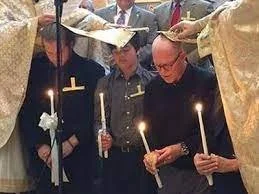Hank Hanegraaff aka the “Bible Answer Man”
Hendrik "Hank" Hanegraaff, also known as the "Bible Answer Man", is a former American Evangelical Christian author and radio show host who converted to Eastern Orthodoxy prior to Easter in 2017. Here are a few of his answers to questions posed as he was received into the Orthodox Christian Church. “Lord willing, fuller detail regarding [his] journey will be forthcoming on future broadcasts, vlogs, and in a book titled, Truth Matters, Life Matters More. More information is found at http://www.equip.org/questions-answers-orthodoxy/
Q. What led you to become Orthodox?
A. In a word, it comes down to “theosis” (union with God) — my growing realization through prolonged prayer and extensive reflection that this transformative process — and ultimate transformation — is the very purpose of human life. What’s more, I’ve come to realize that we can experience the real presence of Christ in the Eucharist. That Holy Communion, rightly understood and administered, is vastly more than memorial. It is the primary means by which we may become by grace what God is by nature. Or as Peter puts it, become partakers of the divine nature (2 Peter 1:4). Increasingly, I’m yearning to know not only about Jesus Christ as the way and the truth but also Jesus Christ as the way and the life (John 14:6).
From within the Christian community, radical elements impose bizarre notions that deny central teachings of the historic Christian faith, including escapist end-time scenarios that have dramatic geopolitical ramifications, counterfeit revivalism, unbridled subjectivism, and the idea that a Christian must never confess sins and seek God’s forgiveness. Moreover, “moralistic therapeutic deism” and biblical and historical illiteracy increasingly characterize the declining spiritual and intellectual state of the American church. Although Orthodoxy is not a panacea, the local body of believers I have connected with has provided a welcome refuge and respite for my family and me in both teaching and practice.
Q. Why have significant numbers of Protestants joined the Orthodox Church?
A. Over the last several decades, substantial numbers of Protestants have joined different liturgical churches, including the Orthodox Church, because of the richness of their traditions and worship and the “groundedness” of their history. While literally thousands of Protestant churches have splintered into a doctrinal “free for all” that ranges from soggy liberalism to the prosperity gospel, Orthodoxy continues in unity to adhere to “the faith once for all delivered to the saints” (Jude 1:3).
Q. Is the Greek Orthodox Church really all that different from Roman Catholicism?
A. First, I should say that some of the greatest logical minds and finest Christian apologists have hailed from the Roman Catholic Church (RCC). That said, there are a number of important differences between Orthodoxy and Roman Catholicism.
I’ve said consistently that the RCC is a true church with what I believe to be significant error. Neither I nor the Christian Research Institute have ever said that the RCC is a false church with some truth. No, it is a true church.
For the first millennium of church history, there was essentially one orthodox New Testament faith rooted in seven ancient ecumenical councils. This may well have remained so had it not been for the Bishop of Rome assuming dominance and, apart from an ecumenical council, altering the universal creed of the church. Since the Great Schism (1054), Catholicism has deviated from Orthodoxy in significant ways. For example, Roman Catholicism forwards the notion that in the intermediate state after death, there are certain sins that can be atoned for by way of temporal punishment in purgatory. Orthodoxy considers the notion of purgation — defined by the Council of Florence (fifteenth century) and defended by the Council of Trent (sixteenth century) — to be a late innovation lacking precedence in both Scripture and the teachings of the Fathers. In distinction to the Catholic idea of purgatory, the Orthodox community views the intermediate state as a foretaste of either eternal reward or eternal punishment, both of which are ultimately fixed on the Day of Judgment.
Catholicism and Orthodoxy are also divided on the validity of papal infallibility (the idea that when the pope speaks ex cathedra — “from the chair” — he does so infallibly). Case in point: in 1950, Pope Pius XII dogmatized the widely held view that Mary “having completed the course of her earthly life, was assumed body and soul into heavenly glory.” Orthodoxy resists such unilateral dogmatization. From the Orthodox perspective, papal infallibility — defined during the first Vatican council in 1870 — has no basis in the creeds and confessions of the historic Christian faith.
Likewise, Orthodoxy considers the Immaculate Conception — defined by Pope Pius IX in the 1854 bull Ineffabilis Deus — an unwarranted innovation. According to this Catholic dogma, from the moment of conception, Mary was kept free from the stain of all original sin. While Orthodoxy venerates Mary, they hold that she was born with the same broken nature as all other human beings.
In sum, unlike Protestantism, which shares a common history and geography with Catholicism, Orthodoxy was not a part of the Western narrative. They did not have a Reformation, did not participate in the selling of indulgences, and did not subscribe to such dogmas as limbo or the celibacy of the priesthood.
Q. To better understand Orthodox beliefs, can you suggest some reading?
A. For starters, try Frederica Mathewes-Green, Welcome to the Orthodox Church: An Introduction to Eastern Christianity (Brewster, MA: Paraclete Press, 2015) and
Michael Shanbour, Know the Faith: A Handbook for Orthodox Christians and Inquirers (Chesterton, IN: Ancient Faith Publishing, 2016).
Visit the Christian Research Institute to share in Hank’s ministry, https://www.equip.org
